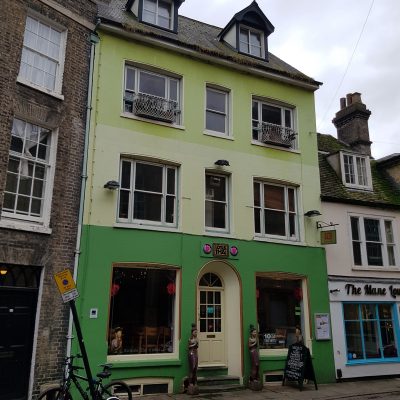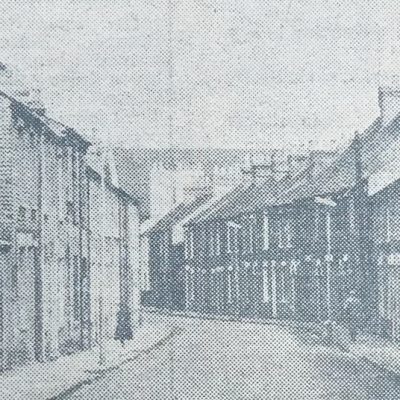Search by topic
- archaeology
- architecture
- bricklayer
- Building of Local Interest
- carpenter
- church
- crime
- dressmaker
- fire
- Great Eastern Railway
- listed building
- medieval
- oral history
- Public House
- Rattee & Kett
- Religious House
- Roman
- scholar
- school
- Then and Now
- tudor
- women
- work
- world war one
- world war two
Search by text
83 Gwydir Street
History of 83 Gwydir Street
1881
Henry Tolliday, head, 31, railway fireman, b Willingham
Julia, wife, 30, b Suffolk
Emily J, daughter, 4, scholar, b Suffolk
Susannah C, daughter, 4, scholar, b Suffolk
George H P, son, 2, b Cambridge
1886
CIP 15.5.1886: A FRACAS. Frederick Scriven, a tailor, of Gwydir-street, was summoned for assaulting Philip Banyard, a builder, of Ainsworth-street, on Sunday.—Mr. Ellison for the complainant.—The complainant said that he met the defendant near Hooper-street, on Sunday afternoon, and he deliberately butted him with his side. He was positive it was intentionally done. He asked the defendant why he wanted to insult him, and he grinned in his face. He said to defendant, “Go on,” and was walking off, when the defendant followed and struck at him and knocked his hat off. He stooped to pick up his hat, and the defendant struck him again, but he was so agitated he could not say where. He then struck at the defendant and “collared” him in self-defence.—By the defendant: He threatened to fight him the next morning, at seven o’clock, “in his agitation,” because he felt “grieved” for the defendant (daughter).—William Ellis, a boiler maker, of Ainsworth-street, said that on the day in question he saw the defendant, in “a straightforward manner,” strike the complainant and knock his hat off, and he went up to them to persuade them to desist, and told the defendant that he ought to be ashamed of himself. He did not see a second blow struck.—By the defendant: He did not see the commencement of the row.—Robert Prime, 108, Ainsworth street, shoemaker, gave corroborative evidence, stating that he saw the defendant apparently accidentally run against the defendant, and words followed, which ended in the defendant striking the complainant.—The defendant said that he accidentally touched the complainant on turning a corner, and he rushed at him, “white as cream,” and the assault followed.—He called Henry Hancock, librarian, who said that he was with the defendant on Sunday afternoon. On passing the corner of Ainsworth-street, the defendant slightly brushed against the complainant, and they then turned round and abused each other. Banyard raved out first, and accused him of having pushed against him, and the defendant denied it. If Banyard had gone on the matter would have ended. After some recrimination, the defendant and complainant ran at each other, and “grinned, but did not kiss” (laughter). They pushed against each other, and their hats fell off. The defendant did not strike Banyard, who put himself in a fighting attitude, and said that he did not care for such a man as defendant, and would box him next morning, at seven o’clock. The defendant said that he was not a fighting man, and declined. A short time afterwards, Ellis came up, and said that he saw the defendant strike the complainant, and that was not correct. —By Mr. Ellison : Scriven did not strike the first blow ; but after the pushing, they closed and rolled against the fence.—Dr. Cooper: They had a preliminary round before the engagement (laughter).—The Mayor said that it was a very poor case to come before the Bench ; but they thought that an assault had been committed, and defendant would be fined 2s. 6d. and costs, but professional costs would not be allowed.
1891
Frederick W Scriven, head, 44, tailor, b Northants
Maria M M, daughter, 19, tailoress, b Cambridge
Gertrude, daughter, 17, pupil teacher, b Cambridge
Henry Williams, servant, 16, tailor’s apprentice, b Chesterton
1901
Thomas Cardwell, 39, whitesmith, b Cambridge
Kate, 36, b Cambridge
Thomas H, 13, b Cambridge
Frederick C, 11, b Cambridge
William, 8, b Cambridge
David, 6, b Cambridge
Beatrice A, 2, b Cambridge
1911
Alexander Wilson, 53, engine driver stationary, b Histon
Catherine, 50, b Suffolk
1913
Alexander Wilson, builder’s engine driver
1962
William Tookey
1970
Mrs M Tookey
Contribute
Do you have any information about the people or places in this article? If so, then please let us know using the Contact page or by emailing capturingcambridge@
License
This work is licensed under CC BY-NC-SA 4.0











